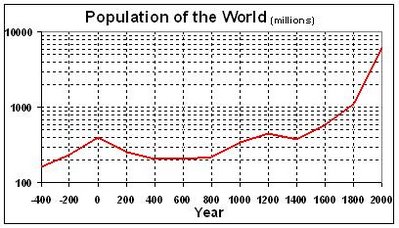Among the seven main causes of economic growth that I discuss here is population growth, which
means more people to work "hard" and "smart"; more output that can be saved and invested; more inventors, innovators, and entrepreneurs whose activities can be leveraged into greater per-capita output; and a multiplication of opportunities for beneficial voluntary exchange.
As I observe here, population growth is a testament to the ability of the human race to provide for itself. What is relevant is not that some people today live in wealth while many more live in poverty, but that human beings -- on the whole -- are far better off than they were 100, 1,000, and 10,000 years ago. Thus:
Estimates for -400 through 1800 are from U.S. Census Bureau, "Historical Estimates of World Population"; estimate for 2000 is from U.S. Census Bureau, "Total Midyear Population for the World: 1950-2050." Year 1 is plotted as Year 0 for ease of illustration. "Upper" estimates are used for -400 through 1800 (where given) because those estimates are taken from a series that extends from -10000 through 1950, and the upper estimate for 1950 in that series agrees with the estimate for 1950 in the series for 1950-2050.

